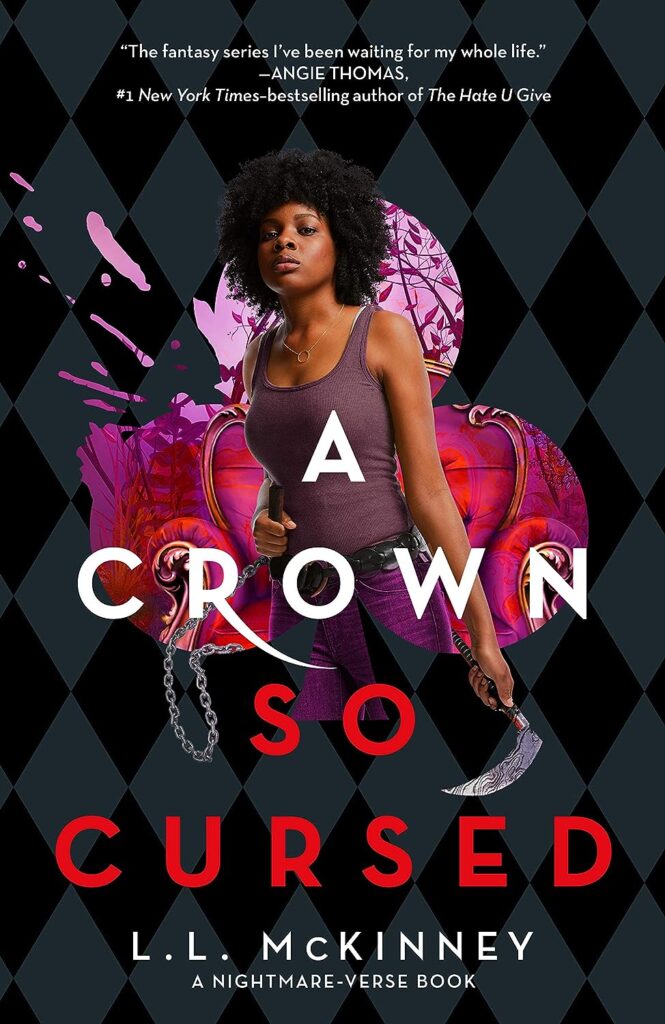"A Crown So Cursed" Is a Thrilling Conclusion to the Nightmareverse Trilogy
Following the gruesome defeat of Wonderland’s Bloody Lady, Alice Kingston is trying to recover and move forward.
However, when stronger Nightmare monsters appear in the real world and literally hit close to home, Alice is forced to pick up her daggers once more and return to Wonderland. This time, she must defeat the evil that has been plaguing Wonderland once and for all—or risk having both her worlds destroyed.
 I have been a fan of L. L. McKinney’s Nightmareverse series since I reviewed A Blade So Black in 2018. The follow up, A Dream So Dark, was even better, and my anticipation for the third book was very high. Now, A Crown So Cursed has finally arrived, and I am happy to say that it has mostly lived up to my expectations.
I have been a fan of L. L. McKinney’s Nightmareverse series since I reviewed A Blade So Black in 2018. The follow up, A Dream So Dark, was even better, and my anticipation for the third book was very high. Now, A Crown So Cursed has finally arrived, and I am happy to say that it has mostly lived up to my expectations.
One of the most notable aspects of this book is that most of the cast is in a state of recovery. Alice Kingston is not the only character who has been physically and mentally drained by the events of book two—all the characters have been impacted by Wonderland directly or indirectly. Alice’s mother, Tina, for instance, still has their house under repair after the events of book 2 and is coming to terms with things Alice told her. Addison Hatta must reconcile his past actions as the Black Knight with the person he wants to be now.
Besides Alice, her grandmother Nana Kingston is the most impressive of all the characters. The previous book hinted that Nana K is much more than she appears to be, especially when she gave Alice the heart pendant. Now, Nana K begins to play an even larger role in Alice’s life that affects Alice deeply, and I enjoyed seeing Alice come into her own through her relationship with Nana.
With most of the cast recovering from earlier conflicts, the antagonist of this book stands out in striking contrast. They are not only the “final boss” of the entire saga, but their true identity represents what happens when you can’t recover from trauma and violence. Not only do they want to destroy Wonderland and the real world alike, but they also want to destroy the people they are supposed to love.
Moreover, the antagonist gives Alice a true test as a heroine, one that Alice passes beautifully. In the previous book, Alice had discovered her Muchness, the part of herself that believes in herself most. Now, she must tap into her highest potential and harness a power she literally never knew she had. This climax reminded me strongly of the anime Sailor Moon.
Not only are the characters compelling on their own, but they also bring the worldbuilding to its peak. The dire results of Addison Hatta’s time as the Black Knight are still felt in Wonderland through certain inhabitants. The area known as The Inbetween reflects the past and future of Wonderland and plays a bigger role in this book than in the previous one. Yet the most engrossing lore is in the hidden truths behind Wonderland’s royal family and how they have affected Wonderland.
My only issue with this book is the pacing. It moves pretty fast, to the point where it seems a little rushed toward the end of the book. This isn’t entirely a bad thing, because there is a lot of action and entertaining dialogue that keeps the reader turning the pages, but there were moments when I wished the characters had been given more time to breathe, especially since some of them spend some time apart from others.
All in all, A Crown So Cursed is a thrilling conclusion to the Nightmareverse trilogy. Fantastic character development and worldbuilding bring this story to a satisfying end. I hope this won’t be the last we meet Alice Kingston and company, because I would personally love to see side stories or a spinoff from this series in the future.

The Afro YA promotes black young adult authors and YA books with black characters, especially those that influence Pennington, an aspiring YA author who believes that black YA readers need diverse books, creators, and stories so that they don’t have to search for their experiences like she did.
Latonya Pennington is a poet and freelance pop culture critic. Their freelance work can also be found at PRIDE, Wear Your Voice magazine, and Black Sci-fi. As a poet, they have been published in Fiyah Lit magazine, Scribes of Nyota, and Argot magazine among others.

